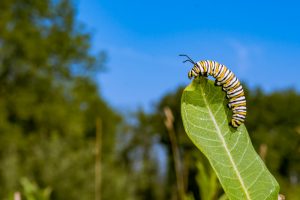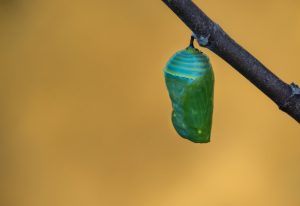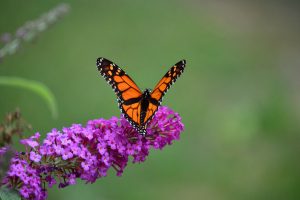My very first year at Greensboro Montessori School, I worked alongside a wise and wonderful teacher, who is also my Montessori mentor. As our year together progressed into late spring, she suggested we teach a unit on the life cycle of the monarch butterfly and sent me afield to pick up a caterpillar tent from a local butterfly farm. It was a curious-looking contraption: a flowering milkweed plant with a gauzy covering. A week into our journey with this kit, my mentor had a family emergency that took her on an unexpected trip overseas ... for four weeks. At a moment’s notice, I found myself entrusted with the care of 12 children; one gerbil (my mentor knew I didn’t do rodents); a ragtag tray of fava beans sprouting in paper cups; and this milkweed plant, the presumed setting for the miracle of metamorphosis. That is, if I could keep it alive. It didn’t take long for me to realize that with this lowly plant came some extraordinary lessons in faith, respect, awe, tenderness, and trust.
 For those uninitiated in the art art of raising caterpillars: they take a while to become visible. A long while. Though we’d been promised that our plant came with a pair of Monarch eggs, those first two weeks rolled by with nary a sighting of the little beasts. Every day we checked for them, and every day I saw the skepticism grow in my students' eyes as I described the wondrous sight we were going to behold. Probably. Eventually. The morning we finally noticed wormholes in the leaves — evidence that our charges were indeed hatched and hungry — felt like waking up to breakfast in bed on your birthday.
For those uninitiated in the art art of raising caterpillars: they take a while to become visible. A long while. Though we’d been promised that our plant came with a pair of Monarch eggs, those first two weeks rolled by with nary a sighting of the little beasts. Every day we checked for them, and every day I saw the skepticism grow in my students' eyes as I described the wondrous sight we were going to behold. Probably. Eventually. The morning we finally noticed wormholes in the leaves — evidence that our charges were indeed hatched and hungry — felt like waking up to breakfast in bed on your birthday.
Once our caterpillars became visible, they grew at a blazing speed, delighting the toddlers with their impossibly lovely stripes and ravenous eating habits. The students relished the idea that these creatures never, ever accepted any food but milkweed. “Wouldn’t you like some pizza, dears?,” I’d ask the worms. “Maybe a nice cup of coffee?” The children would squeal, “NO WAY!,” perhaps reminded of their own choosy appetites. An assortment of suggested names were bandied about, ranging from Lexy to Tiger to Dobo to Burp. (The caterpillars didn’t seem to have a preference.)
 One sunny morning, we found the caterpillars hanging from the leaves in their mysterious “J” formation, the behavior that immediately precedes the formation of the chrysalis. Within hours, they were caterpillars no more. If I had not seen it with my own eyes, I could never have imagined the reverence and care the students extended once this transformation had taken place. They seemed to instinctively know their tiny pets now needed silence and space. Each morning, the toddlers took turns standing guard by the milkweed plant, gazing solemnly at the astonishing beauty of the chrysalises, misting them gently with a spray bottle. Many days of inaction followed ... yet, having awaited their friends’ first emergence, the students now had unwavering patience and faith. Some miracles, they’d learned, are worth waiting for.
One sunny morning, we found the caterpillars hanging from the leaves in their mysterious “J” formation, the behavior that immediately precedes the formation of the chrysalis. Within hours, they were caterpillars no more. If I had not seen it with my own eyes, I could never have imagined the reverence and care the students extended once this transformation had taken place. They seemed to instinctively know their tiny pets now needed silence and space. Each morning, the toddlers took turns standing guard by the milkweed plant, gazing solemnly at the astonishing beauty of the chrysalises, misting them gently with a spray bottle. Many days of inaction followed ... yet, having awaited their friends’ first emergence, the students now had unwavering patience and faith. Some miracles, they’d learned, are worth waiting for.
When the butterflies emerged during the last week of school, we carried them to the playground and prepared to set them free. Before they departed, they allowed each and every toddler to hold them awhile and sing them a send-off song (the choice was painfully obvious: “Let it Go”). When the monarchs finally took to the sky and fluttered toward the Primary garden, I knew the students and I were feeling the exact same mix of elation and heartache. After all, many of our toddlers themselves would soon be flying to the other side of the playground fence, away from the nest of our classroom and our many loving days together.
 Six years later, having raised monarchs with every single toddler class I’ve taught since that first year, it’s time for my own metamorphosis. I am so excited for the new challenges and relationships that await me as I transition into the director of CASA role at Greensboro Montessori School. Yet there’s something about teaching that simply can’t be matched by any other profession. Year after year, I’ve witnessed the beautiful metaphor of little children caring tenderly for the tiny, fragile caterpillars whose lives begin in our classroom. I hope that’s in small part because they, too, have felt tenderly cared for here; that they understand the reverence and awe a teacher experiences as they watch their students grow, and the bittersweet pride they feel when it’s time to set their students free.
Six years later, having raised monarchs with every single toddler class I’ve taught since that first year, it’s time for my own metamorphosis. I am so excited for the new challenges and relationships that await me as I transition into the director of CASA role at Greensboro Montessori School. Yet there’s something about teaching that simply can’t be matched by any other profession. Year after year, I’ve witnessed the beautiful metaphor of little children caring tenderly for the tiny, fragile caterpillars whose lives begin in our classroom. I hope that’s in small part because they, too, have felt tenderly cared for here; that they understand the reverence and awe a teacher experiences as they watch their students grow, and the bittersweet pride they feel when it’s time to set their students free.
This year, when our current crop of monarchs depart for the great big world outside, we’ll all be ready to spread our wings and join them, together, in flight.
 About the Author
About the Author
Brooke Juneau joined Greensboro Montessori School's Toddler faculty in 2013. She holds her Infant & Toddler (bith to 3 years old) Montessori teaching credential and graduated from Hampshire College with a Bachelor of Arts in education and human development. Brooke is the mother of three boys. Her middle son, Hayden, graduated from Greensboro Montessori School in 2017. Brooke plays the guitar and loves singing with her students. Beginning in the 2019-20 school year, Brooke will be the School's director of CASA.


